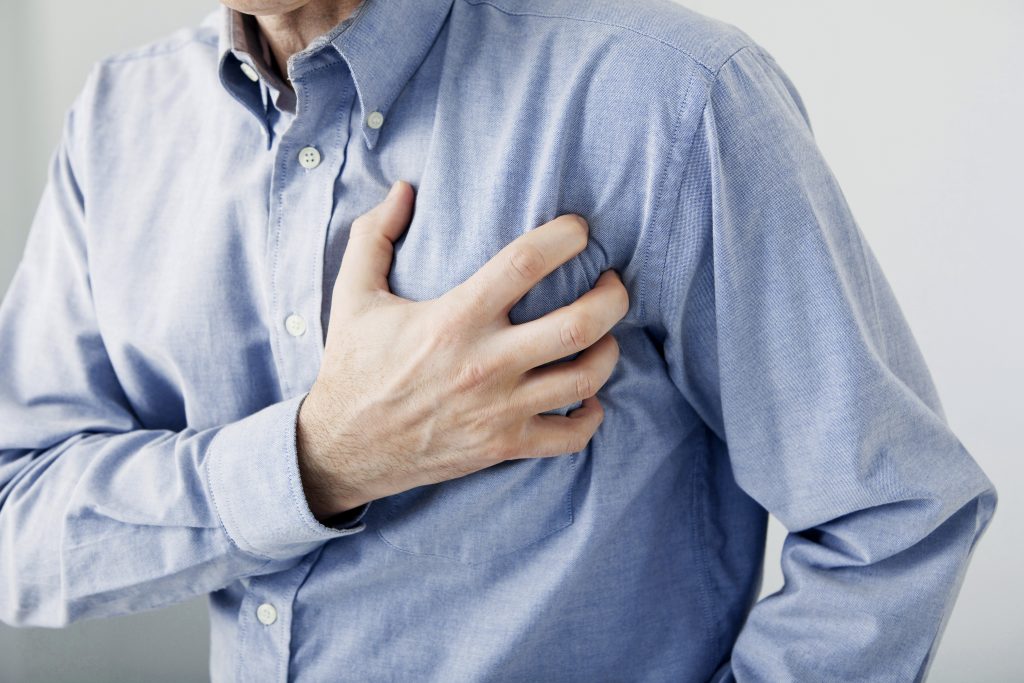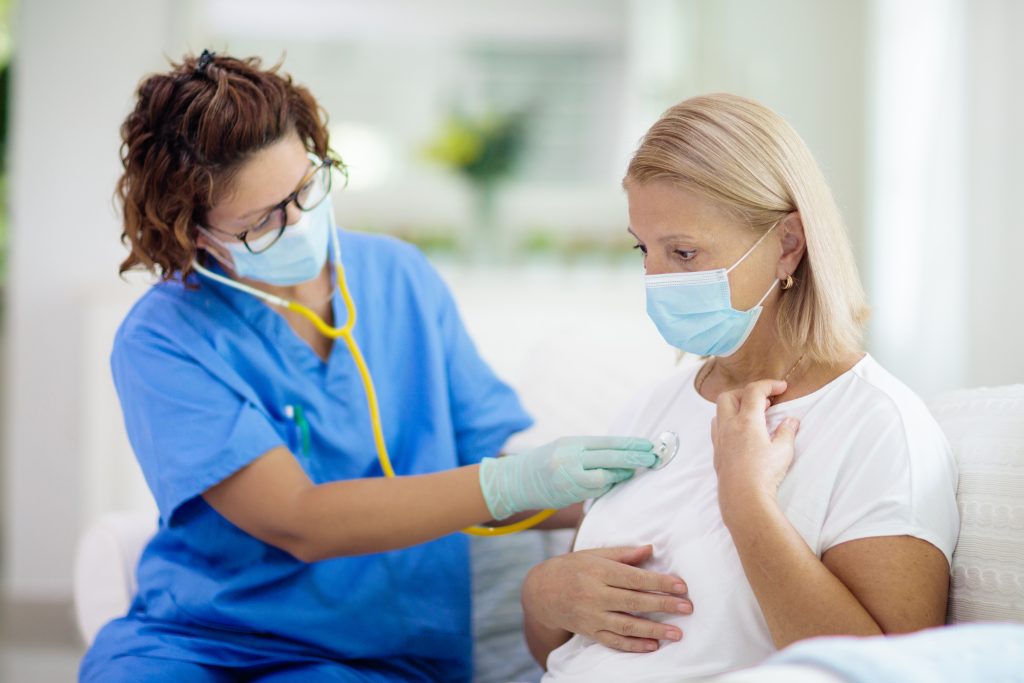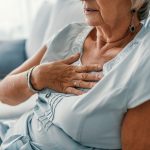June 22, 2022
Can Gas Cause Pain In Chest?
Gas pain is usually felt in your stomach and abdomen, but sometimes it can occur in the chest, too. If at any point you feel gas pain in your chest, it helps to know whether it’s really gas you’re experiencing or symptoms of a heart attack.
Here’s more about gas-related chest pain and steps you can take to make it go away.
Can Gas Cause Chest Pain?
Yes, gas can indeed cause chest pain. Gas-related chest pain is often caused by eating certain foods and beverages. The pain you feel in your chest results from excess gas buildup, which usually goes away on its own after digestion kicks in. Chest pain caused by gas is often accompanied by other symptoms, including heartburn and flatulence.
What Causes Gas Pains In Chest?
 Your diet and the foods you eat are usually the top causes of gas-related chest pain. Dairy and wheat products and carbonated beverages are common culprits that cause gas pains in the chest. Food poisoning that occurs after eating contaminated foods can also cause you to experience this symptom.
Your diet and the foods you eat are usually the top causes of gas-related chest pain. Dairy and wheat products and carbonated beverages are common culprits that cause gas pains in the chest. Food poisoning that occurs after eating contaminated foods can also cause you to experience this symptom.
Health conditions that affect digestion and gut health are other common causes of gas pain in the chest. Crohn’s disease, ulcerative colitis, irritable bowel syndrome (IBS), and gallbladder disease are some of the many conditions that can cause gas buildup and chest pain. Incidentally, all these conditions are also often driven by the foods you eat. Many times, changing your diet can improve symptoms of these conditions and prevent gas pain in your chest.
Gas Pain In Chest vs. Heart Problems
Feeling pain in your chest can be alarming, especially if you’re not sure whether your pain is being caused by gas or a more serious heart problem. Knowing the difference between gas-related chest pain and heart pain can help you avoid hospitalization or death.
Chest pain that is caused by gas will usually be accompanied by additional symptoms, including abdominal pain, flatulence, and heartburn. Chest pain caused by a heart attack will usually feel like a large, gathering pressure in the center or left side of your chest near your heart. This pressure may gradually build and intensify before it goes away on its own or until it progresses into a heart attack.
Symptoms of a heart attack include:
- Shortness of breath
- Nausea
- Dizziness or lightheadedness
- Cold sweat
- Chest pressure or pain that comes and goes
- Discomfort in other areas throughout the upper body, such as in the neck or back
Contact emergency medical services right away if you think you are having a heart attack. A heart attack is a serious medical emergency that requires prompt treatment.
How To Prevent Gas Pain In Chest
Most cases of gas pain are caused by certain foods and beverages. Therefore, avoiding foods and beverages that trigger gas pain is one of the best ways to avoid it.
Take note of which foods and drinks trigger gas pain in your chest. Keep a food journal if you have difficulty tracking and identifying the foods that are causing your symptoms. Then, start eating smaller amounts of those foods or eliminate them from your diet completely.
Eating high-fiber foods is another way to prevent gas pain in your chest. Foods that are high in fiber can improve digestion and push waste out of your system to reduce gas and constipation. Prunes, apples, lentils, chickpeas, and sweet potatoes are some of many healthy high-fiber foods that can often prevent chest pain caused by gas.
How Can Gas Chest Pain Be Treated?
The key to making gas chest pain go away completely is being able to identify and treat its root cause. For example, if a dairy product like ice cream is causing your gas-related chest pain, stop eating ice cream and opt for a dairy-free alternative like popsicles made with real fruit.  A nutritionist or dietitian can also evaluate your diet and make recommendations on how to improve your diet to avoid chest pain.
A nutritionist or dietitian can also evaluate your diet and make recommendations on how to improve your diet to avoid chest pain.
Work with your doctor if you are not sure what is causing gas pain in your chest. Your doctor can run a series of tests to identify its root cause. Blood tests, ultrasound, and lactose intolerance testing can often help your doctor detect diseases like IBS that are causing your symptoms.
If you already have a digestive condition like IBS or Crohn’s disease, take steps to manage your condition as best as possible to avoid chest pain. This may involve taking your medications as directed or trying a new treatment. Consult with your doctor if you think an existing medical condition is contributing to gas chest pain.
Home Remedies For Gas Chest Pain
Changing your diet is one of the top home remedies for gas chest pain. You can also prevent gas pain in your chest by drinking plenty of water, exercising regularly, and eating ginger.
Water promotes good digestion and resolves constipation which may be causing gas pain and buildup. Replace carbonated beverages like soda and beer with water. Drink water throughout the day to stay hydrated—especially on warmer days and on days you exercise.
Exercise is another natural treatment for gas buildup, as it improves your blood circulation. This can help waste move through your digestive system more efficiently. Aim to exercise on most days of the week and do a combination of cardio and weight-training exercises.
Ginger helps stimulate your digestion and can relieve gas pain and buildup in the chest. Keep some form of ginger in your home, whether it’s ginger tea, fresh ginger, or ginger powder. When you experience gas-related chest pain, make a cup of ginger tea or nibble on small pieces of ginger. If you only have ginger powder on hand, shake some into a cup of water or tea.
Treating Chest Pain With Healthcare Associates Of Texas
Visit our website today to request an appointment if you need help identifying or diagnosing the true cause of your chest pain. Our board-certified physicians will work with you to treat and resolve your chest pain to help you find relief.
DISCLAIMER
The information featured in this site is general in nature. The site provides health information designed to complement your personal health management. It does not provide medical advice or health services and is not meant to replace professional advice or imply coverage of specific clinical services or products. The inclusion of links to other web sites does not imply any endorsement of the material on such websites.



